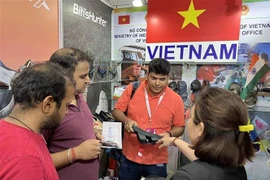It is necessary to travel to India to meet partners, look into Indian companies' business activities and find out important information suchas company name, address, phone number, email, website, legal representative,business code, and goods and services tax (GST) and import and export codes(IEC), said Thuong.
Regarding the contract negotiations, he advised enterprisesto be very cautious and take it step by step.
The exchange of information between the two parties shouldbe in writing or via email, he said, adding that it is necessary to choose the L/C(Letter of Credit) payment method to ensure transaction safety.
In case a dispute happens, businesses need to calmly assessthe situation, discuss directly with their partners and intermediary units suchas customs, transport and logistics service providers, and soon file acomplaint with the Directorate General of Foreign Trade of India.
The official also recommended exporters to buy cargo andmarine insurance to minimise risks during the transaction, as it is veryimportant to protect assets and ensure the safety of firms in the course ofdoing business with Indian partners.
For more information, especially about India’s market and taxregulations, enterprises can search on such websites as https://www.mca.gov.in; www.dgft.gov.in; www.indiantradeportal.in; www.agriexchange.apeda.gov.in, addedThuong./.





























